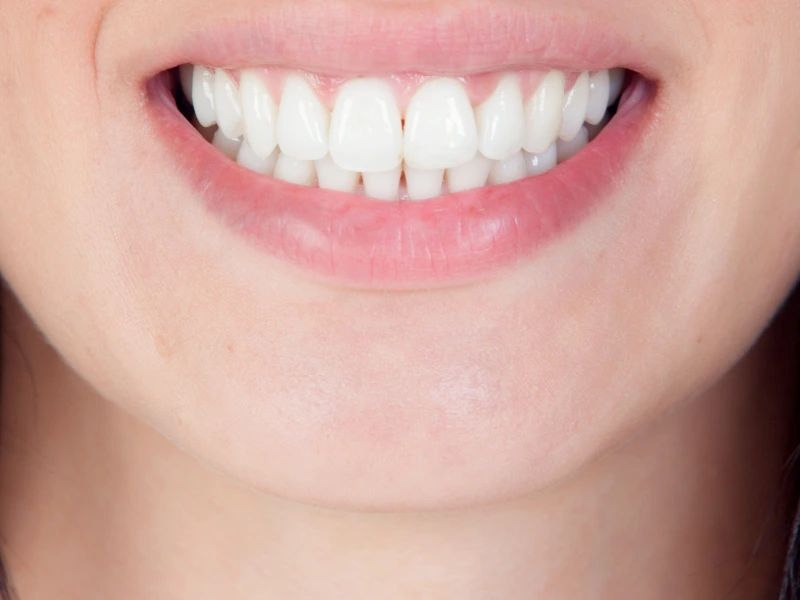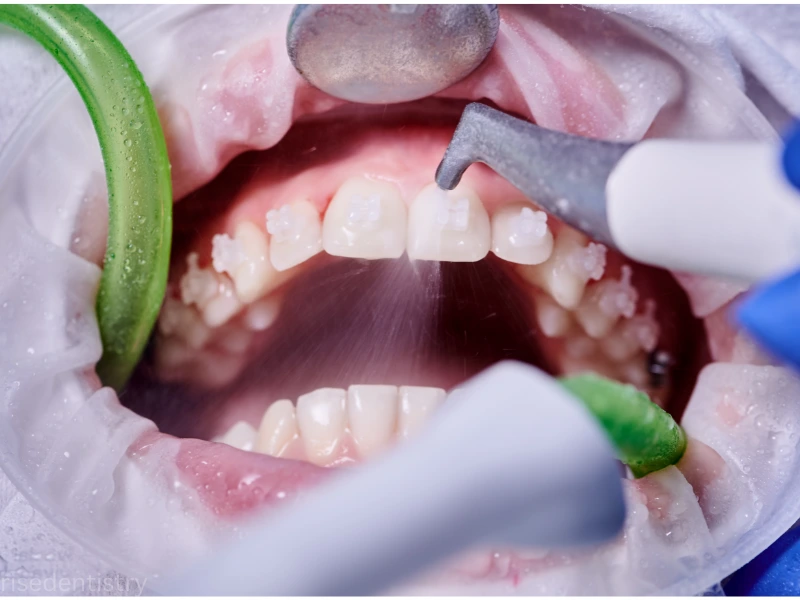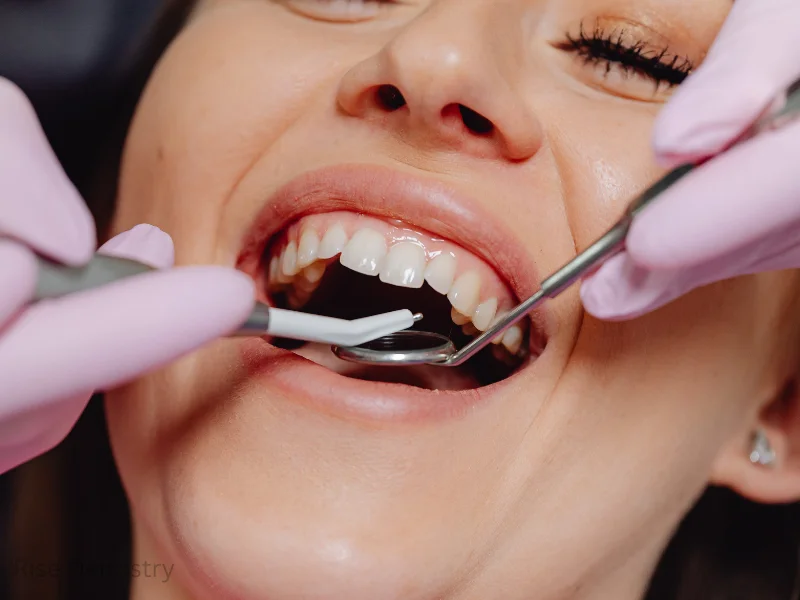
Maintain a healthy, bright smile! Learn how long a professional dental cleaning lasts and why regular visits keep your teeth and gums at their best.
One of the most common questions patients ask is, “How long does a dental cleaning last?” The lasting results depend on your mouth and daily care routine.
For most people, the results of a professional dental cleaning last anywhere from six months up to a year. During this time, your teeth stay smoother, your gums healthier, and your smile fresher. However, the exact timeline varies. If you brush twice a day, floss daily, and watch your diet, the effects of your cleaning will last longer. On the other hand, smoking, poor brushing, or frequent snacking can shorten those results.
Dentists usually recommend another cleaning every six to nine months. This ensures plaque and tartar never get the chance to build up again. Understanding how long your cleaning lasts helps you protect your oral health between visits and maintain a confident smile.
A dental cleaning appointment is simple and usually lasts 30 minutes to an hour, depending on your mouth’s needs. This step-by-step dental cleaning procedure keeps your teeth and gums healthy.
Your dental hygienist begins with a small mirror to check for gum issues, cavities, or early dental concerns.
Scaling comes next. The hygienist carefully removes sticky plaque and hardened tartar along your teeth and gumline. These deposits can’t be brushed away at home.
Once scaling is complete, a high-powered toothbrush with gritty toothpaste polishes your teeth. This step smooths the surface and removes stains.
Your hygienist flosses between every tooth, clearing leftover debris. They may point out areas that need extra care at home.
Many cleanings finish with a quick fluoride treatment. This strengthens enamel and protects against future tooth decay.
Each step ensures your mouth stays clean, fresh, and free of hidden buildup. Learn more about our Dental Cleaning services to see how regular visits protect your oral health.
The length of your cleaning visit isn’t the same for everyone. It can vary depending on your oral health and lifestyle.
Good brushing and flossing make cleanings quicker. Poor habits allow more plaque buildup, which increases the time needed for professional cleaning.
Sugary snacks, coffee, and acidic drinks often cause more buildup and stains. A balanced diet typically means shorter appointments.
Tobacco stains teeth and weakens gums. Patients who smoke often need longer visits because of stubborn tartar and gum irritation.
If you have frequent dental issues or haven’t had a cleaning in years, expect more time in the chair.
Patients with gum disease may need root planing, which takes longer than a routine cleaning. This step removes plaque beneath the gumline.
People who schedule cleanings every six months typically enjoy shorter, easier sessions compared to those who delay visits.
Regular care makes each dental cleaning time smoother and maintains your smile for the long run.
Daily care is essential, but brushing and flossing alone cannot reach every corner of your mouth. Here’s how professional care adds more value:


Brushing two to three times a day removes food particles.

The benefits of brushing teeth 3 times a day are fresh breath and fewer cavities.

Still, it cannot fully clear hidden buildup.


A dental hygienist removes sticky plaque and hardened tartar that home care misses.

This deeper cleaning protects your teeth and gums.


By clearing harmful bacteria, cleanings reduce the risk of cavities.

Early removal prevents small issues from turning into painful dental problems.


Plaque and tartar are common causes of odor.

Removing them during cleaning keeps your mouth feeling fresh.


Hygienists can spot early signs of cavities, gum problems, or other concerns.

In some cases, deep scaling and root planing may be recommended.
Both daily brushing and professional cleaning are essential. One keeps your teeth healthy day to day, while the other provides deep protection for long-term oral health.

A dental cleaning leaves your teeth smooth and fresh, but keeping them that way requires good daily care. Following a few simple habits can extend the results and make the benefits of your dental cleaning duration last longer.

Use fluoride toothpaste to fight bacteria and prevent new plaque buildup. Brush at least two minutes each time.

Flossing clears food particles between teeth that brushing can’t reach. It keeps gums healthy and lowers the risk of dental issues.

Limit sugary snacks and acidic drinks. These foods often weaken enamel and speed up plaque buildup.

Drinking water washes away debris and your mouth stays clean throughout the day.

Smoking or chewing tobacco stains teeth and increases tartar buildup, shortening the benefits of your cleaning.

Consistent visits at Rise Dentistry ensure long-term protection and early detection of concerns.

Simple choices made daily keep your smile brighter and healthier long after your cleaning.

A dental deep cleaning goes beyond routine care. It removes plaque and tartar from below the gumline and treats gum disease. Recovery depends on your oral health and treatment needs.

After your appointment, you may feel some gum soreness. Your mouth could be tender for a few days. This is normal and improves with time.

Recovery length varies depending on your condition. If tartar buildup is severe, recovery may take longer. Some patients may need follow-up visits.

Gently brush with a soft-bristled brush and rinse using mild saltwater. Avoid very hot or cold foods right after treatment. These small steps reduce discomfort.

Most people feel normal within a week. Regular brushing, flossing, and check-ups keep gums strong and prevent future problems. Deep cleaning is an important step toward lasting oral health.


Many people ask about the best time to clean teeth. Dentists recommend brushing in the morning and again at night. Morning brushing clears bacteria from overnight. Brushing before bed removes food particles and plaque from the day.

Even with good habits, home care can’t replace routine dental cleanings. Professional visits at Rise Dentistry reach spots your toothbrush misses and prevent serious dental issues. Patients also often wonder, “dental cleaning how long does it usually take?” The average teeth cleaning time is about 30 to 60 minutes, depending on buildup.
Most patients should schedule cleanings every six to nine months. If you face frequent cavities or gum problems, your dentist may recommend more frequent care.
Regular visits keep your mouth fresh and protect against long-term damage. Consistency matters more than timing alone.
Explore our Family Dentistry services at Rise Dentistry to see how preventive care can keep your entire family smiling.
Dental cleaning results typically last around six months, depending on brushing, flossing, diet, and overall oral health.
Most cleanings are not painful. You may feel mild scraping or pressure, but your dental hygienist works gently to ensure comfort.
Your habits, diet, and dental history all play a role. Heavy plaque buildup or gum disease may require longer or multiple sessions.
Most patients need routine dental cleanings every six to nine months. High-risk patients may benefit from more frequent professional cleanings.
Yes, you can eat right away. If you had a fluoride treatment, wait 30 minutes before eating or drinking.
These simple answers cover the basics. For personalized advice, your dentist can recommend the right care plan for your smile.


Regular dental cleanings are one of the easiest ways to protect your smile for years. They remove harmful buildup, prevent tooth decay, and keep your gums healthy.
The best part is that cleanings are quick. Most visits take less than an hour, yet the benefits last much longer. Investing this small amount of time can save you from painful and costly dental treatments later.
At Rise Dentistry, we believe prevention is always better than cure. Our team focuses on comfort and quality care at every step.
If you’re due for your next cleaning, don’t wait. Schedule your dental cleaning with us today and discover how professional care makes a real difference.
Let us maintain a confident, healthy smile through expert cleanings and complete Family Dentistry services tailored to your needs.
EXCELLENTTrustindex verifies that the original source of the review is Google. "For years, I avoided the dentist due to my anxiety. Dr. Hassan sorathia and their team completely changed my perspective. The office has such a calming atmosphere, and the staff is compassionate and understanding. They explained every step of my treatment and made sure I was comfortable. I'm so grateful I found them and can now take care of my teeth without fear."Posted onTrustindex verifies that the original source of the review is Google. Rise was amazing! They extracted a wisdom tooth from me and the experience was completely pain free. Thank you so much!Posted onTrustindex verifies that the original source of the review is Google. I’m so grateful I found Dr. Sorathia and his wonderful staff at Rise Dentistry! From the moment I called, his office was incredibly accommodating and got me in immediately. He was professional, kind, and patient, and he truly understood my dental anxiety. I never felt rushed or pressured and he welcomed all my questions and explained each step of the process so I always knew what was happening. He made sure I understood all of my options, allowing me to make the most informed decision for my care. I left feeling comfortable, informed, and confident about my treatment. I will absolutely be returning to Dr. Sorathia and highly recommend him to anyone looking for a compassionate and thorough dentist.Posted onTrustindex verifies that the original source of the review is Google. I’m so glad I found this office! Staff is so kind and professional. They keep your comfort at the top of their priority list. Wish I had found them sooner! Can’t recommend this dentist enough!Posted onTrustindex verifies that the original source of the review is Google. Excellent Staff and Dr Sorathia very knowledgeable pleasant ambiance !Posted onTrustindex verifies that the original source of the review is Google. Had a great experience, no wait time, in and out. Everyone was friendly, informative and professional.Posted onTrustindex verifies that the original source of the review is Google. So refreshing to meet an HONEST dentist who isn’t trying to upsell you anything. Just tells you the facts doesn’t try to sway your opinion, just lays out the options based on facts and allows you to choose for yourself what works best for you. I definitely highly recommend!Posted onTrustindex verifies that the original source of the review is Google. Fantastic service! Had a bad tooth that was absolutely killing me for several days. I load going to the dentist so I don’t have a normal one. Set the appointment in the morning and got in that same day. The dentist explained saving versus extracting the tooth and 35 minutes later I was going home. He was extremely thorough and telling me what he was going to do and with the post office instructions. The staff both out front and his assistants were fantastic!! absolutely could not have asked for a better experience and he will be my dentist going forward.
© 2023-2025 Rise Dentistry. All rights reserved.